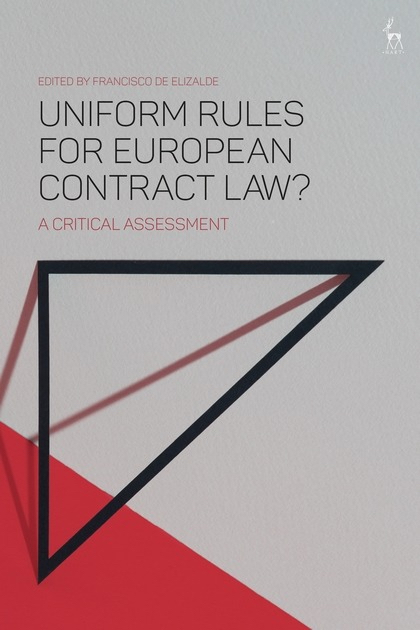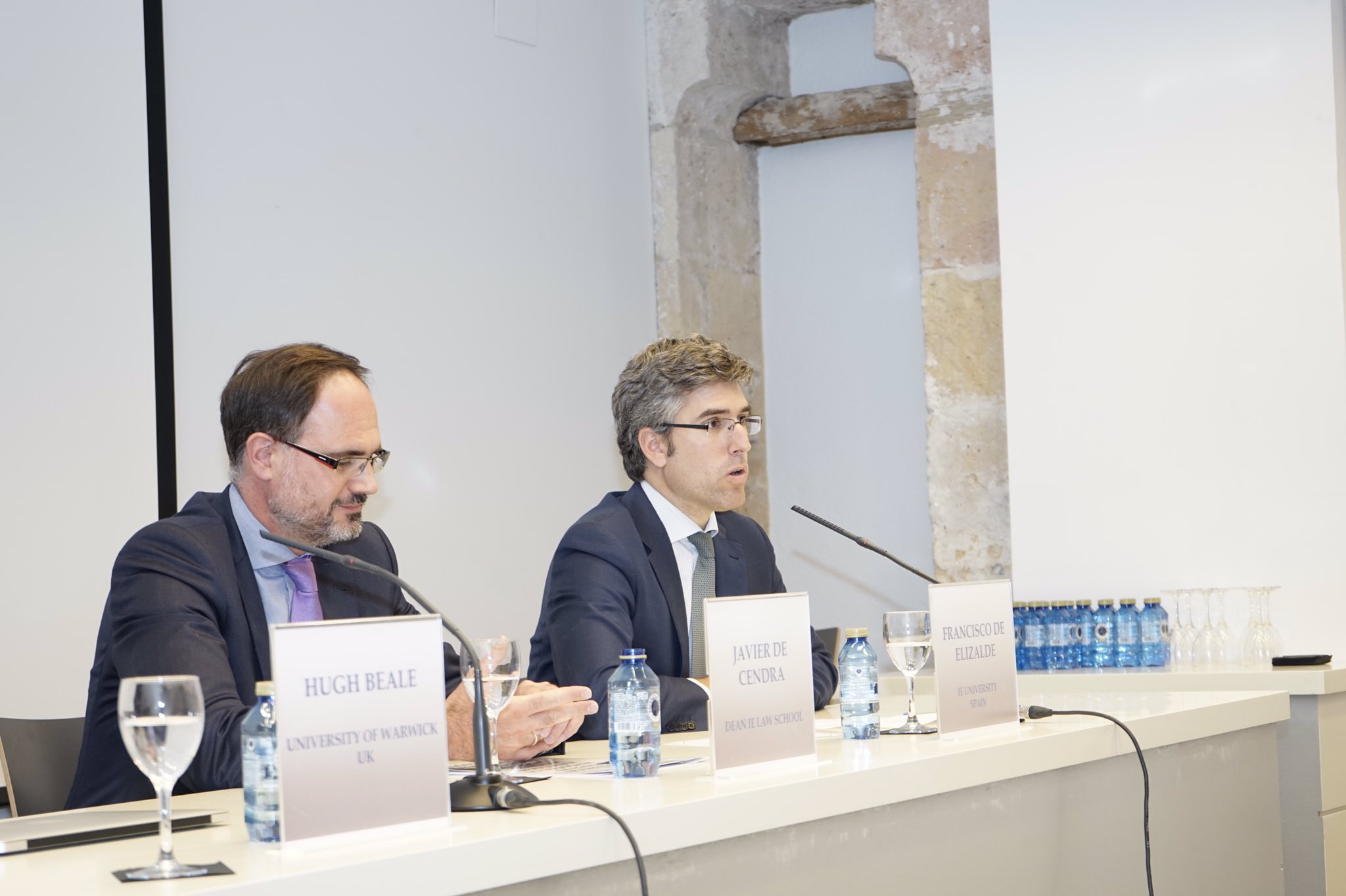Uniform Rules for European Contract Law
Over the last 30 years, the evolution of acquis communautaire in consumer law and harmonising soft law proposals have utterly transformed the landscape of European contract law. The initial enthusiasm and approval for the EU programme has waned and, post Brexit, it currently faces increasing criticism over its effectiveness.
In Uniform Rules for European Contract Law? A Critical Assessment, leading academics under the coordination of Francisco de Elizalde assess the project and ask if such judgements are fair, and suggest how harmonisation in the field might be better achieved.
The book looks at the uniform rules in the context of:
- the internal market;
- national legislators and courts;
- the gap between common and civil law;
- the influence of the uniform rules on states outside the European Union.
Critical and rigorous, the book provides a timely and unflinching critique of one of the most important fields of harmonisation in the European Union.

2016 Uniform Rules International Conference
Uniform Rules for European Contract Law? A Critical Assessment is the outcome of the international conference that Francisco de Elizalde organised with the same title at IE Segovia campus on 23 and 24 June 2016.
Twenty years have already gone by since Part I of the Principles of European Contract Law (PECL) was published and more than ten since the whole project was completed. The PECL, together with Law enacted by the European Union (and its predecessors) have fostered intense activity among scholars in respect of the so-called European Contract Law. A new ius commune in this field seems to be increasingly accepted across the continent and subsequent proposals on Uniform rules for Contract Law have attracted the attention of stakeholders. Among these projects are the Draft Common Frame of Reference (DCFR) or the Proposal for a Regulation on a Common European Sales Law (CESL).
Great effort has been put into their preparation and also the analysis of their particular rules. The aforementioned proposals, however, still remain soft law with doubtful perspectives as regards enactment by the corresponding European institutions. At this stage, it is unclear whether the whole process of drafting uniform rules is still worthy to be pursued.
The conference aimed at assessing the current need for uniform rules in European Contract Law, taking into consideration its possible past benefits. The programme was structured according to the needs set out in the PECL:
These benefits were to a certain extent assumed by the subsequent projects and initiatives.
The programme included a fifth part which expects to analyse the influence of the European process on non-EU countries.
The conference commemorated the 30th anniversary of the incorporation of the Kingdom of Spain into the EEC/EU.

The programme was as follows:
Thursday 23 June 2016
WELCOME
- Welcome. Prof. Javier de Cendra. Dean IE Law School
- Opening keynote speech. Prof. Hugh Beale (University of Warwick, UK). The role for European Contract Law: uniformity or diversity?
PART I
UNIFORM RULES FOR THE INTERNAL MARKET
Chair: Prof. Charlotte Leskinen (IE University, Spain)
- Prof. Bart Wauters (IE University, Spain). Ius Commune and Contract Law
- Prof. Fernando Gómez Pomar (Pompeu Fabra University, Spain). Optimal Standards for the Single Market in Contract and Consumer Law
- Prof. Zeynep Tarman (Koç University, Turkey). Non-state Law in the Arbitration of Commercial Contracts
Friday 24 June 2016
PART II
UNIFORM RULES FOR NATIONAL LEGISLATORS AND COURTS
Chair: Prof. Víctor Torre de Silva (IE Law School, Spain)
- Prof. Encarna Roca i Trías (Magistrate Constitutional Court of Spain). The modernization of the law of obligations by using the principles of European contract law
- Prof. Thomas Ackermann (Ludwig Maximilians Universität, Germany). Uniform rules as guidelines for national courts and legislatures: The German experience
- Prof. Vanessa Mak (Tilburg University, The Netherlands). Better regulation? An evaluation of the influence of uniform rules for European contract law in Dutch law
PART III
UNIFORM RULES TO BRIDGE THE GAP BETWEEN COMMON AND CIVIL LAW
Chair: Prof. Marie-José Garot (IE Law School)
- Prof. Stefan Vogenauer (Director Max Planck Institute for European Legal History, Germany). Uniform Rules on the Interpretation of Contracts to Bridge the Gap between the Civil and the Common Law
- Prof. André Janssen (City University of Hong Kong). Bridging the gap: The CISG as a successful legal hybrid between Common and Civil Law?
- Prof. Francisco de Elizalde (IE University, Spain). Contractual Terms in the Common and Civil Law. Do Uniform Rules reflect a common core?
PART IV
UNIFORM RULES AS A REQUIREMENT OF CONSUMER LAW
Chair: Prof. Fernando Pastor Merchante (IE University)
- Prof. Marco Loos (University of Amsterdam, The Netherlands). Uniform contract law: does consumer law show the way forward?
- Prof. Christian Twigg-Flesner (University of Hull, UK). Designing European Consumer Contract Law rules – the mistakes of past attempts and suggestions for the future
- Prof. Geraint Howells (Dean, City University of Hong Kong). What can consumers gain from uniform European consumer laws?
PART V
UNIFORM RULES AS A MODEL FOR NON-EU COUNTRIES
Chair: Mr. Esteban Leccese (King & Spalding, USA)
- Prof. Mateja Djurovic (City University of Hong Kong). Uniform rules for European Contract Law as a model for the Asian countries
- Prof. Işik Önay (Koç University, Turkey). Effects of European Harmonization on Turkish Contract Law
- Prof. Iñigo de la Maza (Diego Portales University, Chile). The Principles of Latin American Contract Law. Harmonisation as Syncretism
CONCLUSIONS
- Closing speech. Prof. Larry DiMatteo (University of Florida, USA)
- Concluding remarks. Prof. María Paz García Rubio (University of Santiago de Compostela, Spain).
- Final words. Prof. Salvador Carmona, Rector IE University


